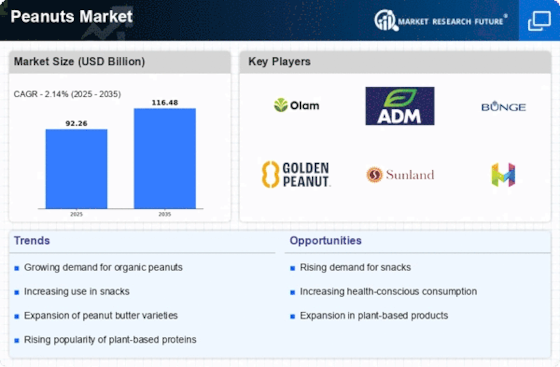Market Analysis
In-depth Analysis of Peanuts Market Industry Landscape
Peanut demand might shift for several reasons in a dynamic market. Peanuts' snack and culinary versatility drives the market. Snacking, creating peanut butter, and adding peanuts to spicy and sweet dishes promote peanut demand.
World economic conditions affect the peanut market. Economic changes determine how much individuals spend and can purchase, which impacts the peanut and peanut product industry. They may purchase cheaper snacks in a weak economy but more expensive and unusual peanut products in a favorable economy. Peanuts are cheaper than other nuts, thus price-conscious people enjoy them.
Weather and cultivation affect peanut market availability. Peanuts grow in various regions and are collected depending on the weather. Peanut growth depends on temperature, rain, and soil quality. Climate change and unpredictable weather affect peanut growers and market prices.
Trade and international relations impact the peanut market. Many nations import and export peanuts, but trade accords, taxation, and international politics may alter this. Changes in trade ties between major peanut-producing and -consuming nations might impact peanut prices and availability worldwide.
Fitness and health trends effect peanut sales. Peanuts provide vitamins, minerals, and healthy fats. Peanuts and peanut products are fast and healthful, therefore health-conscious people prefer them. Due to the clean and healthy food trend, more customers desire natural peanut products with little processing.
New technologies make peanut handling and packing easier, changing the industry. Roasted, spiced, and creatively arranged peanuts look better. New peanut packaging keeps them fresh and lets people buy roasted or flavored peanuts.
The peanut market changes with consumer demand and health. Plant-based diets are becoming more popular, and peanuts provide protein. Variety and energy are peanut butter's hallmarks. Due to changing tastes, people want peanut oil, flour, and food.
The peanuts market is affected by customer tastes, the economy, weather, trade policies, health trends, new technologies, and environmental concerns. Peanut industry stakeholders must understand these market trends to meet changing customer needs, solve production problems, and capitalize on the flexible and beloved peanut market worldwide.



















Leave a Comment